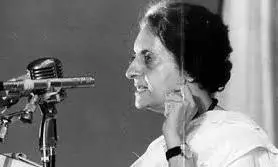
India will not tolerate emergency
text_fieldsThe unsettling memories of the 1975 Emergency, a horrifying chapter in Indian history, are entering half a century. A government that won the will of the people had drawn them into the grip of tyranny. The 21-month period from June 25, 1975, to March 21, 1977, was a period when the aspirations of democracy and freedom were being suffocated. On the midnight of August 14, 1947, it was Pandit Jawaharlal Nehru who made the declaration of independence that India was entering into its own life and independence while the rest of the world was sleeping. However, after 28 years, Nehru's daughter Indira imposed a state of emergency on independent India, subverting the legal system and taking away civil liberties.
Also read: BJP to observe ‘Black Day’ today to mark anniversary of Emergency
Overcoming splits and internal divisions in the party, Indira won the elections to the fifth Lok Sabha in March 1971 with an overwhelming majority of 352 out of 518 seats. The party said, "Indira is India". The Western media called her the empress and even the political opponents hailed her as Durga, the enemy-killing force. So, obsessed with power, she amended the constitution to override the Supreme Court rulings with the strength of a flagrant majority. She also put a close person in the Supreme Court to get her way. There was a clamor from within the Congress to take the country to a presidential system. At the same time, agitations against the mismanagement and corruption of the Congress governments started in various states. In Bihar and Gujarat, the popular sentiment formed at the initiative of students. This was later taken over by farmers and workers. Socialist leader Jayaprakash Narayanan from Patna, Bihar, transformed the popular anger stirred by the severe economic crisis into a nationwide movement for total revolution. It was in this situation that Indira Gandhi tried to secure power with sovereignty. Meanwhile, the Allahabad High Court annulled Indira Gandhi's victory in a petition filed by socialist leader Raj Narayan alleging rigging of the 1971 elections and barred her from contesting the elections for six years. Indira approached the Supreme Court against it. After the Supreme Court ruled upholding the verdict, when the country started to protest and demanded Indira's resignation, the government declared a state of national emergency under Article 352 of the Constitution in the wake of internal disturbances.
Also read: Right to express dissent crucial: Activists write to annul UAPA against Roy
It was an affront to the democratic values upheld by the Constitution. It abolished democratic freedom. Civil rights including freedom of speech, debate, and expression were frozen. People could not approach the courts for fundamental rights. Elections were postponed indefinitely. Political opponents were jailed en masse under the Maintenance of Internal Security Act (MISA). With Indira and her son Sanjay Gandhi, the administration of the country was completely under the control of the Prime Minister's office. As a result, 1,10,000 people were unjustly imprisoned, 1,61,000 people were forced to be sterilized in the name of family planning, and around 7 lakh people were displaced in the bulldozer raj which took place in the name of beautifying the capital Delhi. The Shah Commission, which studied the state of emergency, enumerated many atrocities.
Also read: Press bodies urge Modi Govt to repeal press-restricting laws
But even as the country was crushed under the boots of tyranny, a storm of resistance arose from the last breath of freedom. Indira Gandhi, who declared general elections in 1977 in a rush to sail towards presidential dictatorship under the impression that public anger had set in, was struck by the wind and the call of anger of the people. Indira Gandhi and the emergency were defeated by the popular advance of the opposition Janata Party. That popular victory has become a hope that India will not go into darkness again. Then those in power made Article 352 conditional through the 44th Amendment to the Constitution from the point that the Prime Minister could unilaterally implement it without even consulting the Cabinet.
Also read: Free speech under siege in India: Report reveals 134 instances of infringements
However, the country's power structure as a centralized union of states with limited powers is inherently weak, allowing majoritarianism to override democratic rights. Therefore, the attempt to overcome the threat of emergency by amending the constitution is becoming delusional in India. In 2014, under the leadership of Narendra Modi, the leadership of the BJP, which was led by those who were victims of the emergency, pushed the country into a hidden state of emergency. Those who are constantly criticizing Nehru and Indira and clamoring for a Congress-free India have happily embraced all the corruption including the emergency practices which Congress has left behind. The Indian experience after 2014 has been following the state of emergency that the country pushed to eliminate. Those with the scepter of power have been silencing dissenters. They have also added communalism to autocracy. But it is comforting that the anti-tyrannical attitude of democratic India has remained intact for generations. In 2024, the shock treatment given to the Modi administration by the people proved that there was hope. The people forced the BJP into a coalition government when the party was dreaming of a majority of 400 seats. Prime Minister Narendra Modi yesterday reminded us that the state of emergency is a black stain on Indian democracy and the new generation will not forget that action that tore up the Indian constitution. Let's hope that the warning guides the new administration he leads toward democracy and civil liberties.
Also read: Media groups call Govt banning of news outlets assault on press freedom























